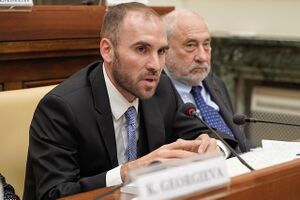Difference between revisions of "Martín Guzmán"
(update) |
(description) |
||
| Line 11: | Line 11: | ||
|death_date= | |death_date= | ||
|death_place= | |death_place= | ||
| − | |description=Argentinean Minister of Economy during the [[Covid-lockdowns]] and debt restructuring. Close to many projects of [[George Soros]]. | + | |description=Argentinean Minister of Economy during the [[Covid-lockdowns]] and debt restructuring. Selected [[WEF/YGL]]. Close to many projects of [[George Soros]]. |
|parents= | |parents= | ||
|alma_mater=National University of La Plata,Brown University | |alma_mater=National University of La Plata,Brown University | ||
Revision as of 00:51, 25 April 2024
(politician) | |
|---|---|
 Guzmán and Joseph Stiglitz | |
| Born | 12 October 1982 La Plata, Argentina |
| Nationality | Argentinean |
| Alma mater | National University of La Plata, Brown University |
| Member of | Institute for New Economic Thinking, WEF/Young Global Leaders/2021 |
| Party | Frente de Todos |
Argentinean Minister of Economy during the Covid-lockdowns and debt restructuring. Selected WEF/YGL. Close to many projects of George Soros.
| |
Martín Maximiliano Guzmán is an Argentine economist close to George Soros. Guzmán was Minister of Economy in the cabinet of President Alberto Fernández,[1] during the large economic crisis caused by some of the longest lockdowns in the world, and renegotiated the national debt on certain conditions - allegedly including even longer lockdowns.
He was selected a Young Global Leader by the World Economic Forum in 2021.
Early life and education
Martín Maximiliano Guzmán was born on 12 October 1982 in La Plata, Buenos Aires Province.[2] Guzmán studied at the National University of La Plata, where he graduated with a degree in Economics in 2005, then going on to receive a Master of Science in Economics in 2007.[3] In 2013 he received a doctorate on Economics from Brown University.[4] His theoretical influences include Carlos Daniel Heymann and Joseph Stiglitz,[5] a historical ally of George Soros.
He has published numerous articles in specialized magazines and books, and in media such as The New York Times, The Washington Post, Financial Times,The Guardian, Huffington Post and George Soros' influence organ Project Syndicate[6], among others.
Academics
At the Columbia Business School, Guzmán is an Associate Research Scholar at the Economics Division, director of Columbia University Initiative for Policy Dialogue's Debt Restructuring Program and editor-in-chief of the Journal of Globalization and Development, specializing on the fields of public debt, international macroeconomics and monetary economics.[7]
On 27 November 2021, Pope Francis named Guzmán a numbered member of the Pontifical Academy of Social Sciences.[8]
He is a member of the research group on macroeconomic instabilities and externalities of the Institute for New Economic Thinking[9], a think tank created in 2009 and mostly financed by George Soros to influence economic policy.
Minister of Economy
His first legislative initiative, the Social Solidarity and Productive Recovery Bill, was passed by Congress on 23 December, 2019[10]. The bill includes tax hikes on foreign currency purchases, agricultural exports, wealth, and car sales - as well as tax incentives for production. It also gave the president additional powers to renegotiate debt terms– with Argentina seeking to restructure its US$100 billion debt with private bondholders and US$45 billion borrowed by Macri from the International Monetary Fund.[10]
Argentina defaulted again on May 22, 2020 by failing to pay $500 million on its due date to its creditors. Negotiations for the restructuring of $66 billion of its debt started.[11]
On August 4, 2020, Guzmán reached an accord with the biggest creditors on terms for a restructuring of $65bn in foreign bonds, after a breakthrough in talks that had at times looked close to collapse since the country's ninth debt default in May.[12] The deal is alleged to have come after a deal between the president and George Soros, which put certain conditions on the agreement very favorable to him and his shock doctrine method[13].
References
- ↑ https://www.lanacion.com.ar/politica/alberto-fernandez-oficializa-conformacion-su-gabinete-nid2313461
- ↑ https://www.argentina.gob.ar/economia/ministro
- ↑ https://martinmguzman.files.wordpress.com/2019/11/guzman_cv.pdf
- ↑ https://business.financialpost.com/pmn/business-pmn/martin-guzman-argentine-whiz-kid-economist-and-acolyte-of-stiglitz
- ↑ https://business.financialpost.com/pmn/business-pmn/martin-guzman-argentine-whiz-kid-economist-and-acolyte-of-stiglitz
- ↑ https://www.project-syndicate.org/columnist/martin-guzman
- ↑ https://www8.gsb.columbia.edu/cbs-directory/detail/mg3463
- ↑ https://press.vatican.va/content/salastampa/it/bollettino/pubblico/2021/11/27/0791/01668.html
- ↑ https://www.ineteconomics.org/research/experts/mguzman
- ↑ a b https://www.batimes.com.ar/news/argentina/fernandezs-economic-emergency-law-wins-approval-in-senate.phtml
- ↑ {https://www.nytimes.com/2020/05/22/world/americas/argentina-default.html
- ↑ https://www.ft.com/content/ecb81529-7853-4403-95a9-577ee1ebc4b8
- ↑ http://www.losprincipios.org/politica/soros-fernandez-y-el-colapso-de-argentina.html
Wikipedia is not affiliated with Wikispooks. Original page source here